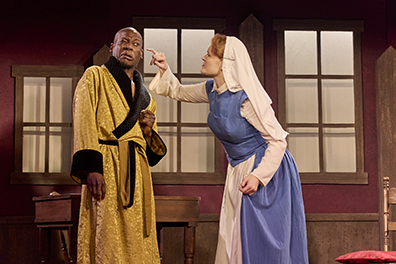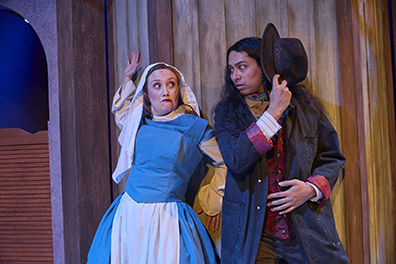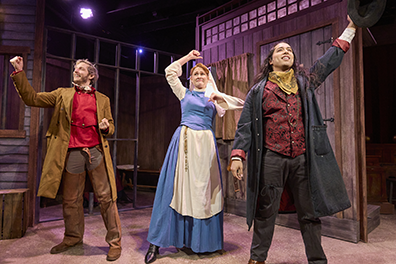Desperate Measures
Riffing on a Problem Play's Problems
Book and lyrics by Peter Kellogg, Music by David Friedman
Constellation Theatre Company, Source Theatre, Washington, D.C.
Monday, February 19, 2024, C–114 (far left)
Directed by Allison Arkell Stockman
Desperate Measures, Peter Kellogg's and David Friedman's M-rated Disneyesque musical comedy set in the 19th century American West, is "inspired by"—but not an adaptation of—William Shakespeare's Measure for Measure. Important distinction. Yet their work, while using rhyming couplets for its spoken script, makes its most significant contribution to Bardology by virtue of just six lines in Shakespeare's play through which their "inspired by" gushes.


Top, Susanna (Julia Link, right), a novice nun pleading for leniency for her condemned brother, accosts the Governor (Greg Watkins) during the bed trick in Constellation Theatre Company's production of Desperate Measures by Peter Kellogg and David Friedman. Above, the other party in the bed trick, saloon girl Bella Rose (Audrey Baker, left) prepares to make her entrance under the direction of the plot's mastermind, Sheriff Martin Green (Tyler Dobies). The musical, inspired by William Shakespeare's Measure for Measure, is playing at the Source Theatre in Washington, D.C. Photos by DJ Corey Photography.
That premise may merely be highfalutin Shakesgeek navel-gazing though, because Kellogg's book and lyrics and Friedman's music create uniquely rich characters, clever humor, and catchy tunes—so catchy you might find yourself singing along the third time the chorus comes around (but please don't). Constellation Theatre Company delivers these qualities in a well-acted, well-sung, two-hour-plus-intermission production playing through March 17 at the Source Theatre in Washington, D.C. For the opening night performance, those "well-acted, well-sung" attributes included understudies Julia Link as Susanna and Audrey Baker as Bella Rose who gave solid performances playing the two women's roles.
Directed by Constellation's founding artistic director, Allison Arkell Stockman, the production is set in a Tombstone representation of Territorial Arizona. Scenic Designer Samuel Klaas's massive timber-façade set (for a 94-seat theater) has a jail and a chapel on stage right and left, respectively. The wall with the jail's porch swings out to become the jail's interior wall. The chapel has a rotating stage that serves variously as the chapel's interior and the saloon girl's dressing room (comprising a travel trunk as her dresser—nice touch by Props Designer Amy Kellett along with many such meaningful details around the stage). At the back of center stage is the Wild Will's Saloon show stage with a red curtain and gold clamshell footlights. Unfortunately, my seat had obstructed sightlines: the jail porch's awning blocked a portion of the upper tier stage from my view, so I missed much of the Governor's performance.
The band, comprising guitar, violin, and double bass and exuberantly conducted by pianist Refiye Tappan sit in a back corner space decorated as a living room with a longhorn skull and framed 19th century family photographs hanging on the wall. Littering the stage edges are wood barrels, crates, and buckets, a prickly pear cactus on the jail porch, and a small saguaro cactus standing up against the upright piano. Jeannette Christensen's costumes evoke 1890s Arizona territory authenticity.
Such a setting offers a suitable thematic relocation for Shakespeare's play. Measure for Measure's 16th century Vienna and dime novels' portrayals of the Old West share a juxtaposition of ultra-morality and open licentiousness—the salon and the saloon—along with transitional governance, all impacting how their societies' carry out law and order. Other productions of Measure for Measure have explored such parallels, including the 2013 Shakespeare in Delaware Park production in Buffalo, New York, reviewed on Shakespeareances.com. Kellogg and Friedman don't fully mine that potential parallel because they don't attempt to shoehorn Shakespeare's plot into their show, but we need to summarize his plot, anyway:
- The Duke takes a sabbatical and puts a young bureaucrat in the seat of governance, but the Duke's purpose is to return disguised as a priest to spy on what happens.
- What happens is that the interim leader, Angelo, enforces Vienna's lapsed morality laws with draconian earnest.
- Moreover, when a novice nun, Isabella, pleads for mercy on her brother condemned to die for getting a maid pregnant out of wedlock, Angelo insists that Isabella have sex with him to earn his leniency for her brother.
- Upon learning of this, the disguised Duke plots a "bed trick," whereby Isabella agrees to the tryst, but a former fiancee of Angelo's, Mariana, takes her place in the dark.
- Angelo is fooled, but he reneges on the deal anyway.
- The Duke returns as himself and stages an elaborate Ellery Queen-like reveal, complete with faked deaths.
While many people think the bed trick is Measure for Measure's weakest and perhaps most ridiculouos component, Kellogg and Friedman make the bed trick the centerpiece of their musical.
Indeed, the fundamental flaw in Measure for Measure's plot is its protagonist, the enigmatic Duke disguised as a priest. Desperate Measures has a priest, Father Morse (Bobby Libby), but the character from Shakespeare's play he most represents is Barnardine, the "dissolute prisoner" in a constant drunk state. For their protagonist, Kellogg and Friedman draw on one of the more intriguing secondary characters in Shakespeare's play, the Provost, in creating Sheriff Martin Green (Tyler Dobies).
Measure for Measure's Claudio becomes Desperate Measures's Johnny Blood (Hunter Ringsmith), who is condemned for fatally shooting a gunslinger harassing his saloon girl girlfriend. Though the gunslinger drew first and Johnny shot in self-defense, the territorial Governor, Otto Von Richterhenkenplfichtgetruber (Greg Watkins), contends a killing is a killing and a hanging is his due. Though the Angelo of this play, don't look for Otto to engage in meaningful moral reflection.
Sheriff Green tries to right this wrong by approaching Johnny's sister to intervene a la Measure for Measure: Isabella the novice nun? No, in this play the Bella is Johnny's saloon girl girlfriend, Bella Rose. His sister is Susanna but, yes, she's a novice nun.
Which brings us to the six lines in Shakespeare's play that most matter in comparing Measure for Measure to Desperate Measures. They come when disguised Duke, visiting Mariana in the Moated Grange at St. Luke's in IV.2, speaks this soliloquy:
O place and greatness! millions of false eyes
Are stuck upon thee: volumes of report
Run with these false and most contrarious quest
Upon thy doings: thousand escapes of wit
Make thee the father of their idle dreams
And rack thee in their fancies.
I must note here that Bella Rose gives Desperate Measures' pre-show speech and, acknowledging that Measure for Measure is known as "a problem play," says, "I can see right away what the problem is: You can't understand half of what they're sayin'." What the Duke is saying here is immaterial to my premise (I think he's railing about Angelo). It's the stage directions before and after these lines that matter: respectively "Exeunt Mariana and Isabella" and "Enter Mariana and Isabella." In the span of the Duke's six-line soliloquy, Isabella has explained to Mariana the bed trick proposition in detail and gained Mariana's acquiescence to play her part.
Just imagine that conversation. Kellogg and Friedman perhaps imagined it because they devote the bulk of their musical's first half on how the two women pull off the bed trick. Even the bed trick itself occurs on stage, which Shakespeare also doesn't let us watch. Furthermore, Desperate Measures injects a key element in this dynamic: In Measure for Measure, Mariana is, by the Duke's account, an honorable woman whereas, in Desperate Measures, Bella Rosa is a prostitute. "She'll have to pretend to be me!" the shocked Susanna says as she tries to shoot down the Sheriff's plan. "They're used to pretending," Sheriff Green replies. In fact, Bella already has a novice costume, but she needs Susanna to coach her how to play a real novice instead of a fantasy.
Much of the musical's humor derives from the collision of the sexually naïve Susanna (when the governor says she must sate his appetite, she thinks he wants her to cook for him) and the business-as-usual showgirl. When in Belle's dressing room, the Sheriff and Susanna broach the scheme, they start by saying Bella will have to perform in bed: "For both of you?" Bella replies. That she'll have to play a nun: "Mother nun or novice?" That she will have to sleep with the governor: "Again?"
The slick humor in Kellogg's rhyming couplet script thrive in his lyrics, too. In "Just for You," Bella and Johnny express the extent of their love for each other: "I would risk my life again," he sings. "I would sleep with a hundred men," she sings. "Don't treat me so good," he sings most earnestly in reply. "I would love you till I die," he sings. "Six more hours, what a guy," she sings most dotingly. "It's Getting Hot in Here," Belle's show tune for the saloon audience (including a disgusted Susanna), is a triple-entendre number referencing the room, her, and what's under the bloomers she's stripped down to.
Matched with Friedman's casually melodic tunes, you could imagine Sebastian the crab or Pumbaa the warthog singing these numbers. This notion entered my mind when Watkins sings the Governor's first number, "Someday They Will Thank Me," like a Disney villain with comic-sauced evil intentions and smugly sharing his confidence with the audience: "They will name their children Otto after me. Even girls will be named Otto." The Disney presence may be in Friednman's DNA: he has many Disney credits in his bio.

From left, Johnny Blood (Hunter Ringsmith), his sister Susanna (Julia Link), and Sherrif Martin Green (Tyler Dobies) sing "It Doesn't Hurt to Try" inside the jail in Constellation Theatre Company's production of Desperate Measures by Peter Kellogg and David Friedman at the Source Theatre in Washington, D.C.. Photo by DJ Photography.
Stockman not only forged her actors into a tight unit executing superb comic timing, she has assembled a cast of fine voices. Ringsmith's Johnny has no hope in his heart but attains heavenly grace with his thrilling turn on "It's Good To Be Alive." In "That's Just How It Is," Dobies's Sheriff sings with moving resignation, poignantly declaring that "humankind ain't kind." Baker's Bella pulls off gutsy, guttural performances whether singing about her hotness or her heart. Link's Susanna is perfunctory when she "begs" the Governor to grant her brother clemency, but at the Sheriff's persistence, she tries again, not once but twice. On her third attempt, the scene becomes arresting, then ratches up several notches as Link moves into the song "Look In Your Heart," which ends with her on her knees as her voice scales the highest registers. Such fine voices are served well by sound designer Kevin Lee Alexander's sound mixes.
Measure for Measure is one of my favorite plays, and Shakespeare's preposterous ending is great theater when earnestly played with exact measures of the seriousness and comedy sizzling through the text. However, when you take out the play's fundamental plot device—the Duke disguised as a priest discovering Angelo's mighty sin and managing his comeuppance—you lose the plot's path to a resolution. That becomes a lingering problem for Desperate Measures: The bed trick, with hilarious stage business involving Susanna, Bella, and Governor Otto, ends the first act. The second half of the play rests on the premise that the supposed Susanna was so great in bed, the Governor demands she marry him. As well plotted and written as the first act is, the second act aimlessly plods to a let's-just-get-out-of-here resolution.
Nevertheless, a subplot emerges that casts interesting light on Shakespeare's most problematic moment in his most problematic play: the Duke springing his apparent marriage proposal on Isabella in the play's final lines while she remains silent. In an intentionally obtuse way, Desperate Measures links Sheriff Green with Measure for Measure's Duke in that Susanna comes to realize the sheriff is actually wearing a disguise: he is an intellectual pretending to be a simple good ol' boy as he enforces the laws in a dangerous, gun-slinging environment. Their time together sparks a fondness between them, and in stage action and song, the sheriff and the novice movingly work out their evolving feelings for each other throughout the musical's second half. It ends up being more of a love story for them than the morality tale Shakespeare wrote and Desperate Measures set out to be.
It makes me wonder: How might Measure for Measure play if Desperate Measures' throughline for Susanna and Sheriff Green inspires that of Isabella and the Duke? It might just solve a big problem.
Eric Minton
March 5, 2024
Comment: e-mail editorial@shakespeareances.com.
Start a discussion in the Bardroom



 Find additional Shakespeareances
Find additional Shakespeareances